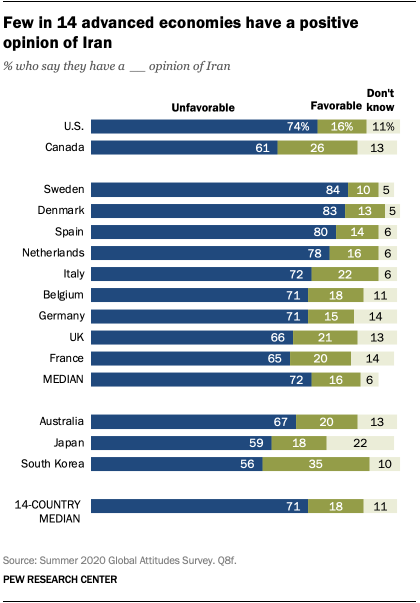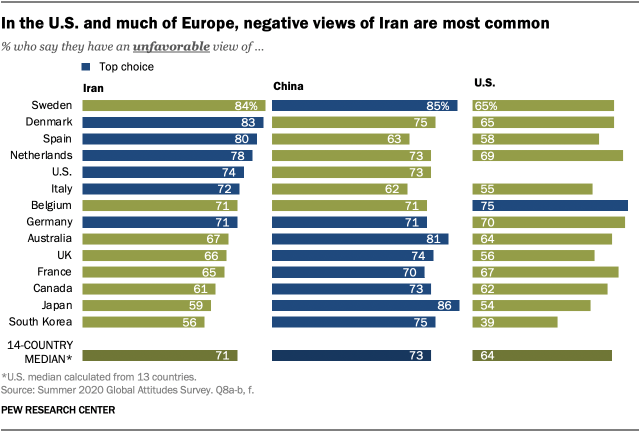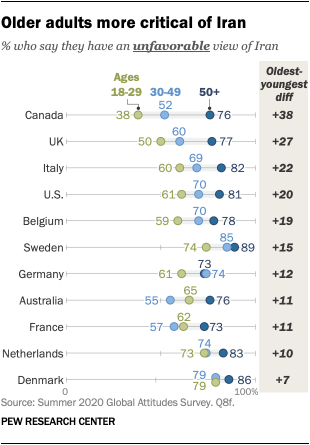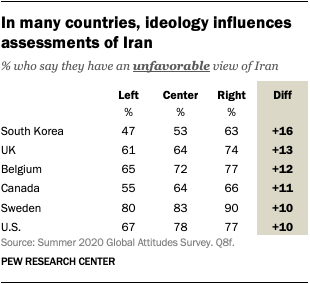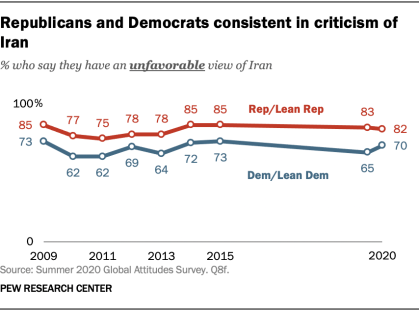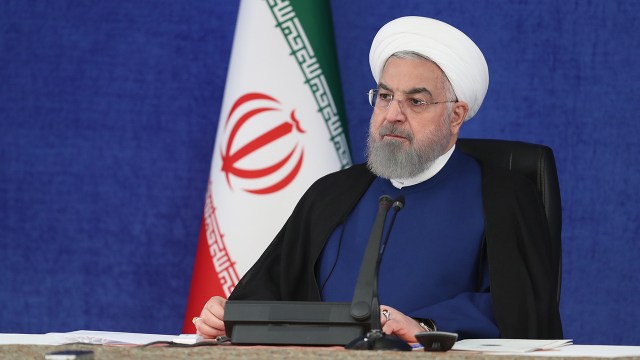
Iran once again has become a top focus of international tensions, with heightened concerns about its nuclear intentions coming on top of years of hostilities over its geopolitical ambitions in the Middle East. This also comes at a time when President-elect Joe Biden has said he wants the U.S. to rejoin the Iran nuclear pact brokered under the Obama administration and from which President Trump withdrew two years ago. But that may be complicated by the Nov. 27 assassination of prominent Iranian nuclear scientist Mohsen Fakhrizadeh, who was killed outside Tehran – for which Iranians have blamed Israel – as well as the killing of another top official, Qassem Soleimani, in a U.S. airstrike earlier this year.
Iran is viewed negatively by people in many countries around the world. In a survey of 14 advanced economies from this summer, a median of about seven-in-ten expressed unfavorable views of Iran, while only about two-in-ten hold a favorable view. A median of roughly one-in-ten expressed no opinion. In all 14 countries surveyed, majorities had negative impressions of Iran.
This analysis focuses on opinions of Iran in 14 advanced economies. This work builds on previous studies of Iran’s favorability and global views of Iran in general.
This study was conducted in countries where nationally representative telephone surveys are feasible. Due to the coronavirus outbreak, face-to-face interviewing is not currently possible in many parts of the world.
For this report, we use data from nationally representative surveys of 14,276 adults from June 10 to Aug. 3, 2020, in 14 advanced economies. All surveys were conducted over the phone with adults in the U.S., Canada, Belgium, Denmark, France, Germany, Italy, the Netherlands, Spain, Sweden, the UK, Australia, Japan and South Korea.
Here are the questions used for this report, along with responses, and its methodology.
The Scandinavian publics polled have the most biting assessments of the Islamic Republic, with over eight-in-ten in both Sweden and Denmark expressing distaste. Spanish and Dutch opinions also are overwhelmingly critical, with about eight-in-ten in each country holding negative views of Iran.
On the flip side, adults in the two East Asian countries included in the survey were the least likely to express dislike of Iran. About six-in-ten or fewer in Japan and South Korea hold Iran in low regard, shares about 10 points or more below the median. In Japan, roughly one-in-five did not weigh in on this question, nor did one-in-ten in South Korea.
Iran received some of the lowest marks among the countries asked about in this year’s survey, which also included the U.S. and China. A 14-country median of 71% said they disliked Iran, making critical views of it more common than unfavorable opinions of the U.S. and about as common as negative assessments of China. In five of the 14 nations surveyed, Iran is the least popular country among those asked about, and in Germany it is tied with China for last place.
In the Asia-Pacific region and Canada, assessments of China are more unfavorable than opinions of Iran by double-digit margins. In the European countries where the largest shares express negative views of China, these divides are smaller.
In 11 of the nations polled, older people were more likely than younger people to give Iran poor marks. And in 10 of those countries, there are double-digit divides in views of Iran between older and younger adults.
Political ideology and affiliation also influence opinions of Iran. In six of the nations surveyed, there were significant differences between those on the left and right of the ideological spectrum. In all countries where there are divides, those on the right had a more critical assessment of Iran than those on the left. In South Korea, those who lean right were 16 points more likely to dislike Iran than their counterparts on the left.
Those who support different political parties also differed in their opinions of Iran. In the U.S., 82% of Republicans and those who lean toward the GOP viewed Iran negatively, compared with seven-in-ten Democrats and Democratic leaners. Despite shifts in U.S.- Iran relations since 2010, divides in assessments of Iran between parties have been largely stable over this time period.
In some European countries, those who support left-wing populist parties were less critical of Iran. Supporters of Italy’s Five Star Movement (-19 percentage points), Spain’s Podemos (-9 points) and France’s France Insoumise (-8 points) are less likely than those who do not support these parties to hold negative views of Iran.
Note: Here are the questions used for this report, along with responses, and its methodology.
